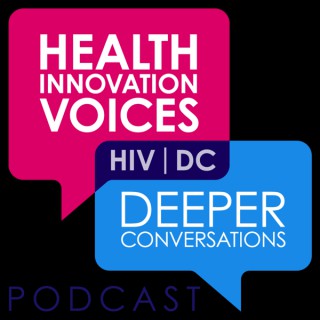Health Innovation Voices: Deeper Conversations (HIV-DC)
Follow Health Innovation Voices: Deeper Conversations (HIV-DC)Health Innovation Voices: Deeper Conversations (HIV-DC), the new four-part podcast from the Effi Barry Training Institute, tackles healthcare issues that matter. Featuring leading voices in the industry, this podcast offers heath care providers with actio
- Jul 26, 2021 LATEST EPISODE
- infrequent NEW EPISODES
- 21m AVG DURATION
- 4 EPISODES
Latest episodes from Health Innovation Voices: Deeper Conversations (HIV-DC)

Health Innovation Voices: Deeper Conversations (HIV-DC) Podcast Episode 4: Dismantling Racism: Explicit Biases within HIV Care Join us for the last episode of Season One of HIV-DC. In this deeper conversation about HIV, we talk about bias and racism in the medical setting. Joining us this episode is Dr. Brandon Wilson, a social science research analyst and project officer for the Center for Medicare and Medicaid Innovation, as well as a health equity advisor on rotation to CMS Office of Minority Health. In this engaging conversation, Dr. Wilson talks about how explicit bias influences medical care for people living with HIV, and what providers can do to create a safe and trusting relationship with patients to improve care. Learning Objectives: -To understand the historical impact of medical neglect of communities of color, particularly same gender loving men -To discuss current implications of implicit bias in clinical settings -To educate providers on strategies to combat bias -To highlight the importance of addressing biases in clinical settings

Health Innovation Voices: Deeper Conversations (HIV-DC) Podcast Episode 3: Birth and Postpartum with HIV In the second of this two part conversion, we discuss how HIV relates to birth and parenting. Join us as we talk with Doctors Phil Bolduc and Thanh Thu Ngo from the Family Health Center of Worcester, in Worchester, Massachusetts, where they both practice family medicine and treat women living with HIV. They share with us how they approach birth and postpartum concerns with their patients and offer some best practices to help women stay healthy as they give birth and care for their children. Continuing Education Credits are available for this podcast. For more information visit: EffiBarryInstitute.org/podcast.

Health Innovation Voices: Deeper Conversations (HIV-DC) Podcast Episode 2: HIV, Pre-Conception, and Pregnancy Join us for part one of a two-part conversation on reducing HIV stigma and centering the health and wellness of parents and babies. In this Deeper Conversation, we delve into HIV, pregnancy, and parenting with Doctors Phil Bolduc and Thanh Thu Ngo from the Family Health Center of Worcester in Worcester, Massachusetts, where they both practice family medicine and treat women living with HIV. Drs. Bolduc and Ngo share how they approach HIV and pregnancy with their patients and offer some best practices to help women stay healthy while they are pregnant. Continuing Education Credits are available for this podcast. For more information visit: EffiBarryInstitute.org/podcast.

Health Innovation Voices: Deeper Conversations (HIV-DC) Podcast Episode 1: In this deeper conversation, we discuss the barriers and stigma faced by Black women around HIV. Dr. Tamara Henry, Associate Professor and Practicum director at the Milken Institute School of Public Health at George Washington University, joined us to examine the factors that contribute to adolescent and adult Black women being overrepresented among people living with HIV in the United States, and what can be done to change that. Continuing Education Credits are available for this podcast. For more information visit: EffiBarryInstitute.org/podcast. Resources: Check out the CDC HIV testing website for more information on HIV & STD testing centers near you! Black women in the U.S. are disproportionately affected by HIV, STIs, COVID-19, intimate partner violence, stigma, and poor maternal and child health outcomes. These inequities can accumulate across the lifespan, undermining overall health outcomes. Check out the Effi Barry Training Institute's 3 part series webinar, “Black Women's Health Across the Lifespan” Part 1:Black Adolescent & Young Women: Sex Positivity and Healthy Relationships Part 2: Black Women and Sexual and Reproductive Health Part 3: Promoting Health and Wellness for Black Older Women








